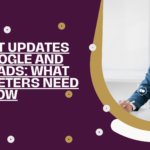High intent! You type it, you see it!
Google ads are not limited till keywords, it targets a whole lot of aspects of a user. Age, income, geography & even device they use can be targeted through Google ads. People using Google to search for educational programs are often in the decision-making phase, they are actively seeking information about courses, degrees, or specific institutions. This means they are more likely to convert into admissions passing through being a warm lead. This targeted approach is why Google Ads is often seen as a go-to platform for educational marketing. It allows institutions to connect with prospective students at the right time, with the right message, leading to higher conversion rates and better ROI.
While Google does not solely relies on interests, but elevates projection from interests through other platform like YouTube and shows relevant videos to the user which can then be used for targeting brand related keywords. Isn’t that smooth! Google ads considers both- search terms and search keywords. Through search terms we can add relevant search terms to the campaign as a ‘keyword’
A Narrative Review on the Impact of Digital Marketing on Students and their Admissions to Higher Educational Institutes in India, by International Journal For Multidisciplinary Research states that “Paid advertising can be divided into two types: text advertisements and graphic advertisements (Wenning, 2021). Google is presently offering Pay per Click (PPC) or AdWords for paid advertising. According to a study (Chien Minfang, 2011), search en-gine marketing supports information search, which is the second step in the decision-making process. Rajkumar, Joseph and Sudhakar (2021) state in their report that Voice Search is becoming more and more popular. People are buying smart speakers such as the Google Home and Amazon Alexa more fre-quently these days. According to the analysis, twenty percent of all searches include terms such as “best,” “how,” and “best.”
We may therefore conclude that search engine marketing techniques enable consumers to obtain clear answers. A successful Google AdWords campaign can be enhanced by the implementation of the appropriate ad extension. A number of distinctive ad extensions provide connections to unique features such as placements, infrastructure, scholarships, and, most importantly, the abil-ity to apply immediately during the digital marketing campaign for higher education. Two landing pages may be constructed, and the performance assessed by A/B split testing (Sofía, 2021).
- High Intent and Targeted Audience
Google’s search engine is unparalleled in capturing the intent of users, particularly those interested in educational services. When individuals turn to Google to search for educational programs, degrees, certifications, or specific institutions, they are typically at a stage where they are actively seeking information that will influence their decisions. This high intent is what makes Google an incredibly powerful tool for generating leads.
For example, someone searching for “best MBA programs in New York” is likely in the process of evaluating their options and is closer to making a decision than someone casually browsing social media. These search queries often reflect a deliberate intention to find solutions to their educational needs. By targeting these users through both organic search (SEO) and paid advertising (Google Ads), educational institutions can connect with prospective students at a critical point in their decision-making journey. The leads generated from such targeted searches are not only more likely to convert, but they also tend to be of higher quality, as they are actively seeking what the institution offers. Additionally, Google’s ability to target long-tail keywords allows institutions to capture niche markets or specific queries, further enhancing the relevance and quality of the leads. - Advanced Advertising and SEO Capabilities
Google provides educational institutions with a comprehensive suite of tools to effectively reach and engage their target audience. Through Google Ads, institutions can create highly specific and targeted advertising campaigns that reach potential students based on factors such as demographics, geographic location, search behavior, and even previous interactions with the institution’s online content. This level of precision in targeting ensures that marketing budgets are spent efficiently, with ads being shown to users who are most likely to be interested in the programs offered.
Moreover, Google’s SEO capabilities allow institutions to optimize their websites and content to appear at the top of search engine results pages (SERPs) for relevant queries. Achieving high organic search rankings is crucial for building credibility and trust, as many users perceive top-ranked websites as more authoritative and reliable. Beyond standard search results, Google My Business listings enhance visibility in local searches, making it easier for local prospects to discover and connect with nearby institutions. - Analytical Capabilities
Google’s analytics and reporting tools are another critical aspect of its advanced capabilities. These tools provide educational institutions with detailed insights into the performance of their campaigns, including which keywords are driving the most traffic, how users are interacting with their ads and landing pages, and which demographic segments are converting at the highest rates. This data-driven approach enables continuous optimization, allowing institutions to refine their strategies over time to maximize lead generation and conversion rates. Additionally, the ability to conduct A/B testing within Google Ads helps institutions test different messaging, offers, and creatives to determine what resonates most with their audience, further enhancing the effectiveness of their marketing efforts.
In summary, Google’s combination of high-intent traffic and sophisticated advertising and SEO tools makes it an indispensable platform for educational institutions aiming to generate the best leads and achieve their enrollment goals. - Comprehensive Audience Reach and Brand Visibility
Google’s unparalleled reach across the internet is one of the key reasons it is so effective for generating leads in the education sector. With billions of searches conducted on Google every day, educational institutions have access to a vast audience that spans across the globe. This massive user base ensures that institutions can reach a diverse array of potential students, ranging from local prospects to international applicants. The ability to segment and target these audiences based on various criteria, such as geographic location, age, interests, and online behavior, ensures that institutions can tailor their messaging to resonate with different segments of their target market. - Data-Driven Decision Making and Continuous Optimization
One of the most significant advantages of using Google for lead generation is the ability to make data-driven decisions and continuously optimize marketing efforts. Google provides educational institutions with a wealth of data through tools like Google Analytics, Google Ads reporting, and Google Search Console. These tools offer deep insights into how users are interacting with an institution’s online presence, including website traffic sources, user behavior on-site, conversion paths, and the effectiveness of different marketing campaigns.



